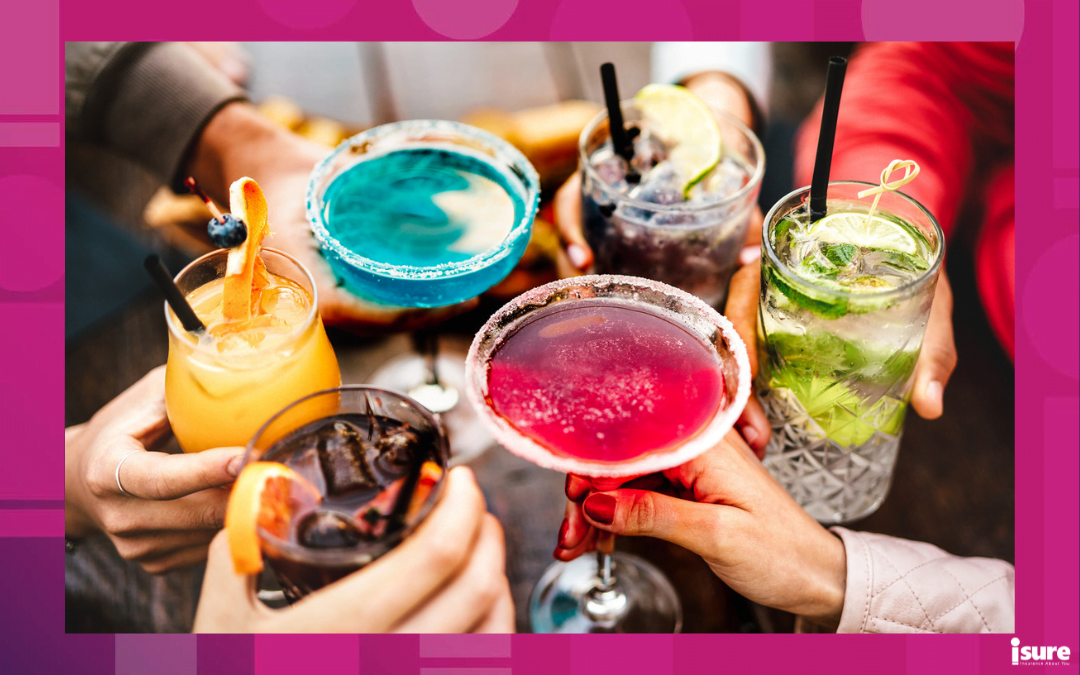When running a business, the opportunity to partake in an alcoholic beverage can sometimes add to the business’ success. However, alcohol consumption also increases the risk of possible injury and property damage. When holding an event at your business, you are placed in a unique position to look after the well-being of your guests as the host. In simple terms, ‘liquor liability’ can help protect you and your business. If you’re looking at opening a bar or restaurant, or if your company is thinking of hosting an event, here are some common questions insurers are asked about liquor liability.
What is this type of insurance?
Liquor Liability is your business’s responsibility to cover losses, damages, or other expenses arising from the injury or death of a person or damage to property where alcohol that you served to one of your customers is deemed to be a contributing factor.
What does it cover?
If you sell, serve, or distribute alcohol, you can be held liable if an intoxicated person claims bodily image or property damage after you have served them. Liquor liability insurance can protect you and your business if you are ever sued. This type of insurance helps to cover settlements, legal costs, property damage repair costs, medical bills, and so forth.
Will my liquor liability insurance cover my business if someone I served drives drunk?
Liquor Liability insurance can help to cover you and your business in cases of:
- Assault and battery (if someone you serve hurts another person)
- Drunk driving (if someone you served is in an accident related to driving intoxicated), and
- Property damage (if someone you served alcohol to causes damage to another person’s belongings while intoxicated)
What isn’t covered by Liquor Liability Insurance?
While Liquor Liability does cover lots of things, it’s also important to know what it does not cover. Liquor Liability does not cover:
- Incidents of slander related to alcohol intoxication.
- Incidents related to underage drinking. Even if you have liability insurance, you and your employees are still responsible for ensuring that ID is checked and that alcohol is not being served to underage patrons.
- It will not cover incidents related to damage to your own property. If an intoxicated person damages something on your business property, this becomes your own responsibility. With that being said, commercial liability insurance coverage can protect you in cases of damage to your property.
Who can be held liable?
When it comes to serving alcohol, multiple people can be held liable if something goes wrong:
- Servers. Servers, including restaurants and bars, are responsible for who they serve alcohol to. Furthermore, servers are responsible for limiting alcohol intake. They can be held responsible if they over-serve alcohol to someone who is past the point of intoxication.
- Occupiers. People, companies, and organizations are responsible for ensuring the safety of those who enter their premises. If anything goes wrong after someone has been served alcohol improperly on the premises, the organization, company, and people behind it can be held liable.
- Employers. Many times, employers host parties or events for their staff. In such a case, they are responsible for the protection and safety of their staff members. Employers can be held liable if someone causes damage or harm while intoxicated after an event or party.
Who needs Liquor Liability Insurance?
Generally speaking, anyone who sells or distributes alcohol should have liquor liability insurance. This includes companies that sell alcohol daily, such as bars, clubs, restaurants, or grocery stores. Taverns, caterers, breweries, and liquor stores should also have liability insurance.
It’s also important to purchase liquor liability insurance for single-day events. If you are throwing a party, work-related event, or even a wedding, you should protect yourself with liability insurance.
How much does Liquor Liability Insurance cost?
The cost of Liquor Liability Insurance varies greatly depending on:
- The size of the business. If you are a large restaurant that serves alcohol regularly, you’re going to pay for more than a one-time wedding event.
- Your claims history. Previous claims may make it very difficult to secure insurance.
- Your location. Liability insurance tends to cost more in high-crime areas where alcohol is regularly an issue.
Does a CGL policy cover liquor liability?
Host liquor liability exposures are often included under standard Commercial General Liability (CGL) policies. It is intended to provide coverage for claims arising from the incidental service of alcohol, such as at social events, like a company barbecue or holiday party.
What is PAL policy?
Party Alcohol Liability (PAL) provides protection if an individual brings a lawsuit against you or your company that hosts a single/multi-day function with alcohol service.
What is commercial host liability?
Commercial host liability falls under the umbrella category of negligence. This generally applies to anyone who doesn’t meet their duty of care to another person or party. Other names for commercial host liability include tavern liability, liquor liability, and bar host liability.
What’s a Party Alcohol Liability (PAL) insurance deductible?
The deductible is the amount of the cost that you’ve agreed to cover on your own for damages before your insurance company covers the rest. It is meant to cover you if you ever experience damage, loss or legal issues due to the event that you are hosting. The resulting repairs or replacements will be first covered by you. Very often, a standard deductible is about $500.
I’m hosting a wedding on my own property. Do I need PAL insurance?
You are not legally required to have PAL insurance, but it is strongly recommended. On a special day, like your wedding in particular, you want everything to run smoothly.
What are the requirements to obtain PAL insurance?
If you and your business are planning to host a party, be sure to have the right coverage. Party Alcohol Liability (PAL) insurance offers coverage if you are hosting an event, such as a company cocktail party or a banquet, where alcohol will be served. When holding these types of events, remember that a valid liquor licence must be obtained from the Liquor Control Board of Ontario.
In conclusion, if you operate a business or are hosting an event that will be serving alcohol, liquor liability insurance should be of top priority. Liquor liability insurance can help protect both you and your business if an incident should occur that is related to alcohol intoxication. Let one of our isure representatives know in advance of your intention to host an event or open a business, and we will help you get the appropriate coverage. We’ll help make your event or business a safe success!




